| Srl | Item |
| 1 |
ID:
155137


|
|
|
|
|
| Summary/Abstract |
Treating the threat of climate change in the Caribbean as a case study instructive for responses globally, this article examines the social and political relations of climate change. It argues for an analysis taking into account the ways in which the histories of imperialism and colonialism have shaped contemporary global ‘development’ pathways. The article charts how Caribbean vulnerability to temperature rises of more than 1.5°C of warming comprise an existential threat structured by contemporary social relations that are imperialist in character. Hope can be taken from a politics of climate justice which acknowledges the climate debts owed to the region.
|
|
|
|
|
|
|
|
|
|
|
|
|
|
|
|
| 2 |
ID:
088065


|
|
|
|
|
| Publication |
2009.
|
| Summary/Abstract |
Many scholarly analyses of small economies over the past two decades have been premised on the implicit understanding that a state's small population size, compounded by such factors as islandness and remoteness from markets, is to blame for an inherent and unavoidable economic vulnerability. The article critiques the core features of this approach, and proposes in turn to discuss and profile the development trajectories of small economies from the vantage point of the strategic flexibility used by small states (at multiple levels as individuals, household units, corporate entities and complete jurisdictions) in seeking to exploit opportunities and maximize economic gains in a turbulent and dynamic external environment with which they must engage. Keeping alive a portfolio of skills and revenue streams enables these actors to migrate inter-sectorally as well as trans-nationally.
|
|
|
|
|
|
|
|
|
|
|
|
|
|
|
|
| 3 |
ID:
149833
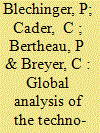

|
|
|
|
|
| Summary/Abstract |
Globally, small islands below 100,000 inhabitants represent a large number of diesel based mini-grids. With volatile fossil fuel costs which are most likely to increase in the long-run and competitive renewable energy technologies the introduction of such sustainable power generation system seems a viable and environmental friendly option. Nevertheless the implementation of renewable energies on small islands is quite low based on high transaction costs and missing knowledge according to the market potential.
|
|
|
|
|
|
|
|
|
|
|
|
|
|
|
|
| 4 |
ID:
168869


|
|
|
|
|
| Summary/Abstract |
For decades, the world's smallest states – the structurally weakest members of the multilateral system – have been considered incapable of influencing international organisations (IOs). So, why has the label small state risen to prominence over the last two decades and become institutionalised as a formal grouping in multiple IOs? Drawing on more than eighty in-depth interviews, we explain the rise of Small Island Developing States in the United Nations system, the expansion of their agenda to the Small and Vulnerable Economies group at the World Trade Organization, and then to other IOs. The adoption of the labels is evidence of small state norm diffusion. We identify the competent performance of vulnerability within multilateral settings as the key to explaining this norm emergence and diffusion. The lesson is that diffusion ‘from below’ is not always driven by a desire to increase rank. In this case small states have gained benefits by maintaining a lowly position in a hierarchy in which large is stronger than small.
|
|
|
|
|
|
|
|
|
|
|
|
|
|
|
|
| 5 |
ID:
166692
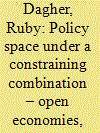

|
|
|
|
|
| Summary/Abstract |
Small island developing states (SIDS) face significant economic, social and environmental challenges. Current mainstream approaches to SIDS recognise these limitations and thus promote increased economic integration into the international economy to provide the governments with resources and power to counter the effects of these challenges. Yet these remedies have so far led to high levels of deficits and high levels of indebtedness, as well as high levels of vulnerability and dependence on key sectors that offer very income- and economically sensitive products and services. In addition, and in assessing the experience of Caribbean SIDS, these remedies have led to diminishing government policy space. This has in turn contributed to the lack of real innovation in the way Caribbean SIDS interact with the volatile international market. While much has been written about the economic impact of open markets and the inherent weaknesses within SIDS, the analysis herein allows for the development of a more comprehensive assessment of the implications for the SIDS’ policy space as well as their ability to regain it and develop innovative approaches that avoid uniquely reactionary measures to the current international economy and its gyrations.
|
|
|
|
|
|
|
|
|
|
|
|
|
|
|
|
| 6 |
ID:
149838
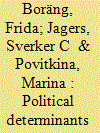

|
|
|
|
|
| Summary/Abstract |
This paper approaches provision of affordable and reliable electricity in Small Island Developing States (SIDS) as a case of public good provision. It aims to contribute to our understanding of how regime type and the quality of implementing institutions within political systems affect the prerequisites for successful electrification in SIDS. More specifically, we analyse the independent and interdependent effects of level of democracy and control of corruption on per capita household electricity consumption in SIDS, using data from 34 SIDS over the period 1996–2009. The results show that although the independent effects of level of democracy and control of corruption are sensitive to model specification, these two factors do have an interdependent impact on per capita household electricity consumption: democratization has positive effects on provision of electricity to the general population only when there is a certain level of corruption control in place. The results imply a) that it is important for policy actors to acknowledge the interaction between regime type and the quality of implementing institutions, and b) when planning electrification projects in SIDS, it is necessary to have information about the social and political context in order to design the most effective projects.
|
|
|
|
|
|
|
|
|
|
|
|
|
|
|
|
| 7 |
ID:
176733
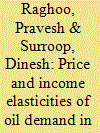

|
|
|
|
|
| Summary/Abstract |
There are no studies that quantify the effects of price and income on the demand of fuel oil, gasoline and diesel oil in Mauritius. In line with increasing retail prices for these commodities, there is no estimation of the effect that increasing price, income and other variables like electricity and vehicle stock have on demand of petroleum products which affects effective policymaking in this area. This study uses an ARDL–ECM model to determine consumer response on petroleum demand when price and income in Mauritius changes. The study determines the income and price elasticities of demand which is a needed parameter in transportation and taxation policies. It was found that gasoline is price and income inelastic in the short–run, diesel oil is income inelastic in the long–run and fuel oil is inelastic in the short–run but becomes elastic in the long–run, other variables being not significant. The effect of rising electricity consumption on fuel oil demand was to a ratio of 1: 1.1 on average. Vehicle stock is estimated to cause unprecedented increase in gasoline demand by nearly 3.1% on average. Results are essential for transportation and energy taxation policymaking.
|
|
|
|
|
|
|
|
|
|
|
|
|
|
|
|
| 8 |
ID:
149830
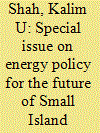

|
|
|
| 9 |
ID:
113960
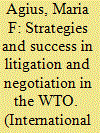

|
|
|
|
|
| Publication |
2012.
|
| Summary/Abstract |
This article analyzes linkages between litigation in the World Trade Organization (WTO) Dispute Settlement Body (DSB) and negotiation in multilateral trade rounds and develops a typology of links that can occur between the two processes. These include creating conditions where bargaining is informed by law, influencing the agenda-setting and creating momentum for negotiation on key issues, and affecting the status quo from which negotiations proceed by influencing interpretation of trade rules in the DSB. The purpose is to test whether poor and inexperienced states that are disadvantaged in negotiations can improve their bargaining power in negotiation rounds by pursuing legal proceedings, to see whether links can be exploited for strategy-making to promote the interests of these states, and to discuss how the WTO as an international organization benefits from their empowerment. The strategies suggested in this article could improve the commitment and active participation of relatively non-influential member states. This could be conducive to perceptions of the WTO as a legitimate organization and to a more constructive climate for effective negotiations.
|
|
|
|
|
|
|
|
|
|
|
|
|
|
|
|